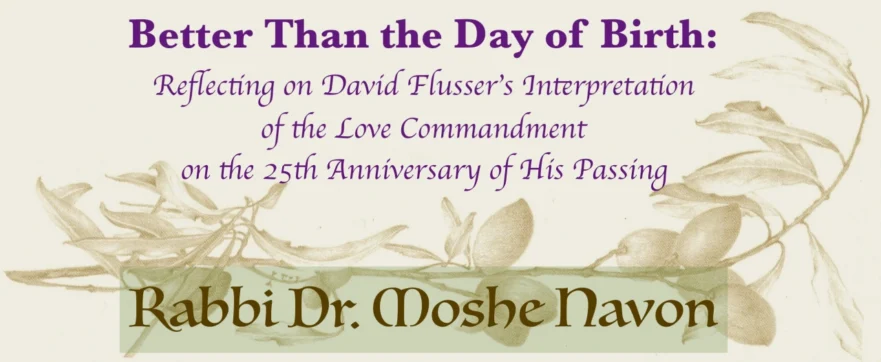How to cite this article: Moshe Navon, “Better Than the Day of Birth: Reflecting on David Flusser’s Interpretation of the Love Commandment on the 25th Anniversary of His Passing,” Jerusalem Perspective (2025): [https://www.jerusalemperspective.com/31263/].
In my own small archive of memories of David Flusser I remember once coming to his modest Jerusalem home for a lesson, not realizing that David was sitting Shiv‘a (i.e., he was in mourning) for his brother who had just passed away. When I arrived David stood up and said to those who had come to comfort him: “My student has arrived. Now I will teach him!” In light of this memory I can think of no better way to honor the memory of David—l’ilui neshama (“for the elevation of his soul”)—than to reflect on some of his most important teaching with you.
David Flusser left this world on September 15, 2000, which also happened to be his 83rd birthday. Friends called to wish him a happy birthday, only to learn that it had become the day of his passing. The coincidence of David’s birth and death taking place on the same day of the year calls to mind a saying of Kohelet: The day of death is better than the day of birth (Eccl. 7:1).
Premium Members and Friends of JP must be signed in to view this content.
If you are not a Premium Member or Friend, please consider registering. Prices start at $5/month if paid annually, with other options for monthly and quarterly and more: Sign Up For Premium

- [1] Text and translation according to https://www.sefaria.org/Midrash_Tanchuma%2C_Vayakhel.1.3?lang=bi. ↩
- [2] Text and translation according to https://www.sefaria.org/Midrash_Tanchuma_Buber%2C_Vayakhel.1.3?lang=bi
. ↩ - [3] Translation according to https://www.sefaria.org/sheets/224482.21?lang=bi&with=all&lang2=en. ↩
- [4] Translation according to https://www.sefaria.org/Mishnah_Sanhedrin.4.5?lang=bi&with=Commentary&lang2=en. ↩
- [5] See John 4:20–24 for Jesus’ conversation with the Samaritan woman about the proper place to worship God, and Luke 9:51–53 for the episode in which the Samaritans refused to receive Jesus because he was on his way to Jerusalem. See also Jonathan Ben-Dov, “An Altar on Mt Ebal or Mt Gerizim?—The Torah in the Sectarian Debate” [https://www.thetorah.com/article/an-altar-on-mt-ebal-or-mt-gerizim-the-torah-in-the-sectarian-debate?utm_source=chatgpt.com]. ↩
- [6] On the Hebraic background of this verse, Joshua N. Tilton, “Perfect Children,” WholeStones.org (March 4, 2017) [https://wholestones.org/2017/03/04/perfect-children/]. ↩
- [7] Peninei Halakhah (“Pearls of Halakhah”), R. Eliezer Melamed — launched 1993; 22 vols.; online; Eng. trans. since 2014 (e.g., Laws of Shabbat Vol. 1, 2016). ↩
- [8] Hilula (Aram./Heb. הִלּוּלָא, “celebration”)—a joyful commemoration of a tzaddik’s yahrzeit (day of passing), marked with prayer, study, charity, and often pilgrimage to the grave; e.g., Lag BaOmer, the hilula of Rabbi Shimon bar Yochai. ↩
- [9] Text and translation according to https://www.sefaria.org/Peninei_Halakhah%2C_Zemanim.5.2.5. ↩





Comments 1
Hi Moshe,
Thanks for your blessed tribute to David Flusser. I have learned a lot from reading his books. He has contributed a lot of very interesting and hidden historical facts about Jesus and the 2nd Temple era.
Regarding “love”, I think your interpretation is mistaken because you emotionalize the meaning of the term instead of taking it in the context of covenant fidelity. I left the church many years ago when I began to realize how badly they pervert Jesus’ teachings for the sake of their theological propaganda. So long as the ministers can keep everyone feeling good, they can continue to collect money from them and expand their religious fifedoms.
Anyway, the way I understand “love” in the Christian Bible is that it is a CHOICE. It is a choice to SELF-GOVERN WITH RIGHT MOTIVES on the basis of Jesus’ redemption + obedience to God’s law (much of which is spelled-out in Moses). The purpose for self-government is one’s preparation for Jesus’ 2nd Advent when he establishes YHWH’s kingdom on earth. It is those people who properly self-govern that Jesus will select to populate his government administration. You can read about their character at the beginning of the ‘Sermon on the Mount’.
Along the same lines, you mentioned Matthew 5:48. In the USA we have a founding principle of Constitutional government known as EQUAL APPLICATION OF THE LAW TO EVERYONE. Although the nation today operates on a double-standard for the rich and government vs. the working class (today’s modern slave state), that principle is the same as the one that Jesus enunciated in Matthew 5:48.
When we combine true covenant “love” with “equal application of the law to everyone”, we end up with a very soundly structured society within which people can thrive and find happiness and prosperity. Now compare that with what we see today in every nation of the world!
Thanks again for your lovely tribute to David Flusser,
…Chris